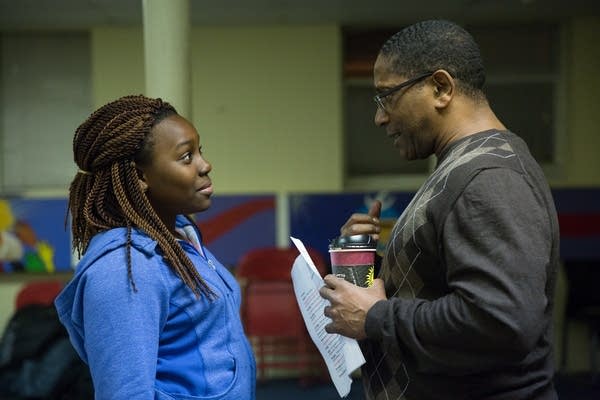Minneapolis teacher empowers black youth with Kwanzaa

Go Deeper.
Create an account or log in to save stories.
Like this?
Thanks for liking this story! We have added it to a list of your favorite stories.
Titilayo Bediako and her fellow teachers were wondering how they could help black students do better in class.
It was 1996 at Lyndale Community School, and Bediako still remembers her response.
"I said, 'I am going to start something that focuses in on black children's' successes, rather than their failures,' " Bediako recalled.
So, she introduced her students to Kwanzaa — a cultural celebration created in 1966 by Ron Karenga, a California-based advocate for Afrocentric education.
Turn Up Your Support
MPR News helps you turn down the noise and build shared understanding. Turn up your support for this public resource and keep trusted journalism accessible to all.

Twenty years later, that early classroom lesson has grown into an institution that hosts an annual musical Kwanzaa recognition. This year's celebration at the Ordway Theater on Monday promises to be the biggest yet.
Kwanzaa is based on seven principles, Bediako said: "Unity, self-determination, collective work and responsibility, cooperative economics, purpose, creativity and faith." Each day of the weeklong celebration focuses on one principle.
Her students learned how people of African descent have relied on these principles to survive historic hardships and make vital contributions to the world.
Bediako soon turned those lessons into an after-school program called the We Win Institute, which she designed to help students from diverse racial and ethnic backgrounds improve in school by making them more confident young people.
The program is for children and youth between the ages of 5 and 18 from across the metro, and includes mentoring, academic help and a youth gardening project.

Chandra Nwasor, who is African American, was part of the initial group of students to participate in We Win. The experience was empowering, she said.
"What it really did for me was it ... taught about Sankofa, and getting back to our roots and our greatness," she said, "which is not a lot that I had growing up."
Sankofa — from the Twi language of Ghana — means "go back and get it."
Now Nwasor has two children. Both are in the We Win program and one of them, her 6-year-old son, will be in this year's Kwanzaa production.

Nwasor said her kids have learned to be proud and aware of their ancestry. Her son's favorite Kwanzaa principle is self-determination.
Her 4-year-old daughter has learned how to sing the black national anthem, "Lift Every Voice and Sing."
It's particularly important for young black children to be exposed to positive messages about their culture, she said.
"We need to be teaching children about their history and their greatness," Nwasor said. "A lot of times, especially in media and things we're only hearing about the bad things going on, or a lot of just negativity."

Nwasor is one of many former students who are teaching their own kids about Kwanzaa.
Bediako said she remembered running into a student she hadn't seen in 15 years. The woman had five children of her own, and she hugged Bediako and thanked her.
"She said that I was her favorite teacher and how she takes the principles of Kwanzaa, and how she teaches them to her children," Bediako recalled, "and what a difference it makes in terms of helping them learn how to love themselves."
While black youth have a lot to gain from learning about Kwanzaa, Bediako said, the principles themselves are universal. She added that many of her white and Asian students learned how to teach others about where they come from.

If you go
The Kwanzaa recognition show starts at 7 p.m. on Monday at the Ordway Theater in St. Paul. Performers include Sounds of Blackness, Thomasina Petrus and T. Mychal Rambo.


